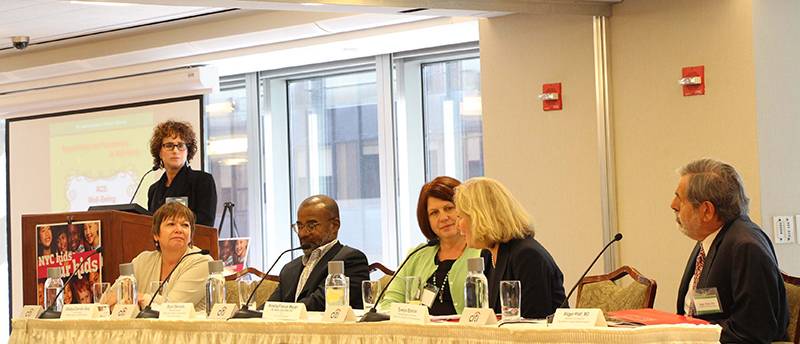
 Administration for Children's Services311
Administration for Children's Services311 Search all NYC.gov websites
Search all NYC.gov websites
October 27, 2014
ACS Leadership Considers Strategies to Achieve Well-Being
Since being appointed to lead ACS, Commissioner Gladys Carrión has emphasized the need to move the agency beyond a safety and permanency framework to one that includes well-being. To begin the discussion on how ACS as an agency along with its partners can improve the well-being of children, youth and families, Commissioner Carrión gathered some of the major thinkers and practitioners in child welfare for the first ACS Well-Being Conference held at the Citi Executive Center in Manhattan on October 27.
New York City Mayor, Bill de Blasio declared the conference open and reiterated his commitment to the work of the agency to improve outcomes for children in its care. The conference also heard from leaders in the child welfare field including Amelia Franck Mayer, Chief Executive Officer of Anu Family Services based in Wisconsin and Minnesota, and Susan Notkin, Associate Director of the Center for the Study of Social Policy. Kathy Goetz Wolf, Founder and CEO of Be Strong Families, Evelyn Blanck, Associate Director of the New York Center for Child Development, and Dr. Roger Platt, the Director of the Office of School Health, a joint program of the NYC Department of Education and the Department of Health of Mental Hygiene later joined the main speakers on a panel of experts to answer questions from the audience on well-being.

Commissioner Carrión welcomed everyone to the conference noting that well-being for kids in foster care and juvenile justice involves focusing on the outcomes we would want for our own children -- reaching their developmental milestones such as: reading at grade level, graduating from high school and furthering their education, being able to acquire a job that pays a living wage, and maintaining healthy relationships. She listed some questions facing the child welfare community in achieving well-being including how to realign our systems to focus on outcomes, how to configure our data collection and analysis systems to tell us what we need to know about how kids are faring, and how to engage our providers and foster families in the new well-being model.
The Commissioner noted that helping children and families to achieve well-being required the efforts of everyone and she pointed to posters displayed around the room from the new child safety campaign launched by ACS recently under the theme New York City Kids are Our Kids. “The issues impacting our children can only be addressed collaboratively-with communities and families seen as critical assets; with our providers, city agencies, the courts; and of course, young people themselves,” she added.
In his keynote address Bryan Samuels, Executive Director of Chapin Hall Center for Children spoke about the work being done nationally in the areas of trauma of children known to child welfare. He cited research showing that removing children did not result in dealing with the issues that brought them to the child welfare system. He noted that one of the effect of being in the system is poor outcomes for children leaving the system. “We know from our research that putting children in a safe environment doesn’t correct the experience of neglect and maltreatment.” Samuels said that issues affecting the primary caregiver such as domestic violence, a history of abuse and neglect, mental health problems, drug and alcohol abuse, as well as poor parenting skills all contributed to toxic stress in the home and were more likely to be more common among children in out of home placements. He noted that in order to achieve better outcomes we need to look more closely at the impact of trauma on all domains including the physical, cognitive/mental, emotional behavioral well-being.
Samuels listed some Simple Rules to Shift Focus to Well-Being
- Have a simple vision; pick and emphasize the key metrics that drive your decisions.
- Think big, but start small; you can always add data and evidence later.
- Build the right data foundation; collect and integrate data from multiple sources.
- Look for research evidence to test policies and practices that are most likely to produce impact.
- Plan and take action based on the best available information.
- Continue to look for opportunities to streamline casework practice, service delivery, procedures and accountability systems.
Amelia Franck Mayer defined well-being as “A state of being in balance or alignment (body, mind and spirit). In this state, we feel ourselves as content, connected to purpose, peaceful, in harmony, happy, prosperous, and safe.” She said that in order to make the shift to a well-being practice, Anu adapted simultaneous efforts across the organization’s environment and culture as well as its systems, policies and practices, incorporating youth, foster families, social workers, supervisors, contractors and partners, and the Board of Directors. She said, the organization developed a model of well-being for youth and their healers which uses trauma informed parenting, integrative healing interventions, supports building networks of support and connection and addressing grief, trauma and loss.
In addition, she explained the Anu model of well-being in which staff are encouraged to engage in healing practices such as yoga and meditation, prioritize and strengthen their own family connections, improve their own parenting skills and engage in activities that build resilience. “Practice what you preach; work on yourself before you work on others,” she stressed.
The seminar was attended by over 200 leadership from ACS contract provider agencies, schools of Social Work in NYC, Children’s Services, child welfare advocacy organizations, and other partners. It was supported by the Annie Casey Foundation and New Yorkers for Children.
ACS OFFICE OF COMMUNICATIONS
Contact: pressoffice@acs.nyc.gov (212) 341-0999


